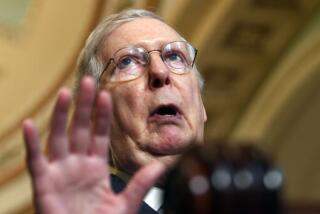Study Will Seek Alternatives in Meeting Rising Cost of Welfare
- Share via
NEW YORK — The Ford Foundation launched a major three-year study Thursday to seek ways to cope with the rising costs of Social Security, medical care and welfare programs in the United States.
“The growth in social spending over the past two decades has produced what many analysts are calling the crisis of the welfare state,” Franklin A. Thomas, the foundation’s president, said in announcing the program. “The problem is not unique to the United States; nearly all the industrialized democracies are straining to pay for the social protection and welfare needs of their people.
“Our aim is to stimulate a wide-ranging inquiry into alternative approaches to providing essential social insurance and welfare services, taking into account changes in the economy, in the family and work, and in the nation’s age profile.”
Executive Panel
An executive panel of businessmen, lawyers, foundation executives and union leaders, headed by Irving S. Shapiro, former chief executive of E. I. duPont de Nemours & Co., will oversee the project and make recommendations on new social policies to protect future generations.
The foundation will study such issues as who should benefit from social programs and what kinds of programs should be available for different segments of the population. It will analyze costs, ask whether the nation has the resources to meet the expenses and study the role of government and the private sector.
“Many social policy experts argue that given slower rates of economic growth, aging populations and other social changes, democracies can no longer bear the increasing burden of social programs,” Thomas said. “They argue for reductions, but too often focus primarily, or only, on programs for the poor that have limited political constituencies.
“A more thorough examination of social policy would need to look not only at safety net programs for the needy but also programs that provide entitlements to citizens with incomes well above those of the poor.”
More to Read
Sign up for Essential California
The most important California stories and recommendations in your inbox every morning.
You may occasionally receive promotional content from the Los Angeles Times.













